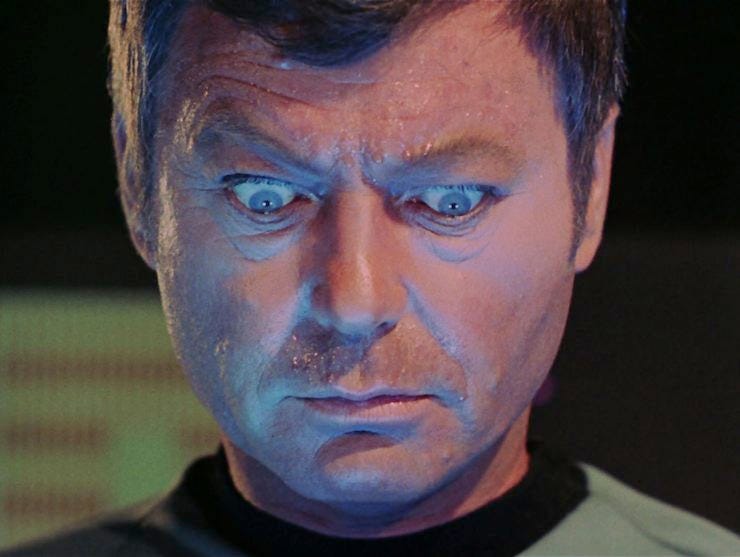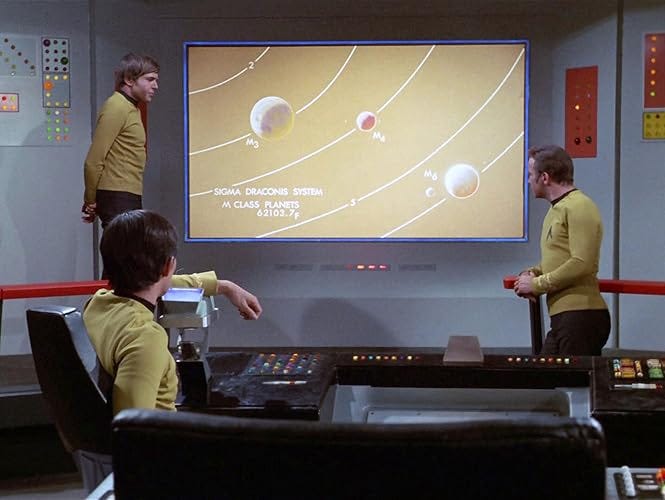"Spock's Brain" - Season 3, Episode 1
Star Trek enters pop culture lore with its "worst" episode.
Is this the worst episode of Star Trek?
Star Trek has had some stinkers, and you can read about them conveniently in my season recaps. Rarely does a 20+ episode season of television emerge unscathed. Budgets get stretched, time slips away, bad scripts sometimes must be produced. But no episode of Star Trek occupies a darker place in the general culture’s, collective memory than “Spock’s Brain.” In many ways, it forms a totemic, polar system with “The City on the Edge of Forever.” For most, that earlier episode holds all of the good and promise of Star Trek. It is romantic, sweeping, and tackles a thorny moral question with a science-fiction approach. It won a Hugo and Writers’ Guild Award, accounting for the only critical recognition the show ever received. It was “written” by a respected and serious author. More than any other episode, for many fans “The City on the Edge of Forever” is all that the show could hope to be.
“Spock’s Brain” is much the opposite. It arrives as the first episode of Season 3, universally regarded as the worst season of the show, and one which arrived with a reduced budgetary allotment amid middling ratings, saved in part through a dogged, first of its kind fan-write-in campaign. It was the first episode to air in the new “death slot” of 10:00 pm EST on Friday’s, ensuring that anyone with a social life had better things to do. It was the first episode produced by Fred Freiberger, the controversial new producer assigned the show by NBC, who replaced the largely beloved Gene L. Coon.1 Its perceived disastrousness is almost preordained; the worst of the show is within it.
The “villainous” Kara (Marj Dusay) locates her prey. Dusay was a staple at Star Trek conventions due to her role in this infamous episode, but she was best known for her role on the soap opera Guiding Light, which she appeared on over the course of 26 years.
But is “Spock’s Brain” really that bad?
Well, reader, it is not good. This is not a revisionist piece. But “Spock’s Brain” is also not a wholesale disaster on the level of “The Omega Glory” either, which truly represents the show at its most flailing and misguided. “Spock’s Brain” has acquired its reputation, I think, not because it is bad but because it is bad and goofy.
The show’s relationship to comedy has always been somewhat distance. Never absent, but never mastered, Star Trek’s overtly comedic episodes come few and far between, usually in the middle of a season. Only “The Trouble with Tribbles” has emerged from these episodes as “classic” Trek - although “A Piece of the Action is the better watch - and they are mostly chuckled at and left alone. But there is no ignoring “Spock’s Brain.” It is the first episode of the season, and after the break in production, the show returned with a dumb premise. It has never been forgiven for it. The premise is that a beautiful alien woman appears on board the Enterprise and steals Spock’s brain.
That’s less of a problem than you may think. Spock’s body is just fine without his brain due to the mysteries of this alien’s advanced medical prowess. However, the crew only have 24 hours to retrieve Spock’s brain before his body becomes irrevocably destroyed. Off they go after the thinnest of ion energy trails.
Strike one here is that yes, this is dumb. But, if we’re being honest, no dumber than the Enterprise fighting the ghost of Jack the Ripper or the literal god Apollo or a leprechaun and Easter Bunny in the same episode. But there’s a full at-bat left. Strike two: the limp and arbitrary way this happens, with flashes of green light across the screen standing in for all of the action. The reduced budget shows. Strike three - no hits or balls here - is that the nature of the premise completely sidelines Leonard Nimoy. Spock, and thus Nimoy, spends the entire episode as a kind of robot automaton, a literal stand-in, without agency or dialogue. McCoy pilots him around with a little remote control. That’s it. It goes perhaps without saying but the Kirk-Spock-McCoy dynamic is Enterprise’s engine. “Spock’s Brain” stalls it out from the opening moment.
Kirk, Chekov, and Sulu debate which planet to target in their search. This Powerpoint presentation is one of the most interesting moments in the episode.
Because of that, the rest of the episode feels ephemeral. It’s barely there. There’s a genuine moment of clever staging where Kirk, Chekov, Uhura, and Sulu attempt to figure out which of three planets in a nearby star system their thieving alien absconded towards. Using the bridge’s main screen like an interactive slide projector, the crew weigh the evidence before Kirk is forced to make a call. Basic deductive reasoning amounts to the most exciting set piece in the entire episode.
The planet chosen is a cold almost-wasteland, containing trace amounts of the unique ion energy Scotty has identified as the alien’s calling card. The surface is populated by generic cavemen who, when interrogated, reveal they have no concept of women. Said women live underground, kept warm in a complex base none of them know how to operate, itself revealed through some easy snooping by Kirk.
I must admit, I briefly thought there might be something here. The gender split, the brutish men and pampered women, there seemed to be something of a misogynistic satire to this. Alas, that notion was quickly disabused once the episode shifts underground. Gestures towards “mental atrophy” and the downsides of automation emerge - the women are explicitly stupid and unaware of how the technology that cares for them works - but are drowned in bad writing. One thing Star Trek largely elides is language barriers; aliens often just speak clear English with little to no explanation. If there’s one positive to “Spock’s Brain,” it’s proving that creative choice correct. The conversations between the crew and the women are downright annoying; the latter’s child-like dialect slows down every conversation and causes to a truly infamous moment:
It is quite a bit of this in the back half.
But eventually, the episode meanders its way to a resolution: Spock’s brain has been kidnapped to act as a kind of manager for this underground society. How they heard about him: unclear. Why he suddenly seems to act as a benevolent god: unclear. Why he seems unbothered by this: unclear. The only thing illuminated is that the old manager died after 10,000 years of hard work and that the women have a machine they can use to temporarily turn them into geniuses, allowing them the capacity to find the new manager before they go back to their childlike, simple nature.
Thankfully for the crew, they’re able to use that machine themselves and free Spock with the stolen knowledge. The episode ends bizarrely, with McCoy performing reconstructive brain surgery on Spock, who eventually becomes lucid enough to assist McCoy’s as his knowledge cocktail wears off. With Spock cured, he begins motormouthing about all the incredible things that he learned and happened to him while he was a brain in a vat. Roll credits.
McCoy works to reinstall Spock’s brain into his body. Nimoy spends most of the episode roughly this active, totally blank and stumbling around. Notice the massive screen blocking the only action occurring in the shot. It’s quite the visual synecdoche.
There is some dream-like, delirious editing during the surgery - overlapping faces and dissolves and mixed narration to convey the passage of time - that reeks of budgetary constraints but nevertheless wraps around to being interesting. Outside the sudden turn into near-surrealism, the end has nothing to recommend. Even once restored, Spock’s characterization feels off. He is too jovial, eager, like an intellectual puppy dog thrilled with his own discoveries. The detached, bemused demeanor common to Nimoy’s performance is nowhere to be found; when coupled with the absurdities of Spock instructing McCoy on his own brain surgery, the end sequence feels like a long set-up with no punchline.
Ultimately, that’s how the episode feels as a whole. There’s a germ of some idea here, of Spock’s intelligence being robbed and exploited by others, that is executed through banalities. Rather than have Nimoy play dumb, he plays blank. Rather than have a scheming villain, they have a collection of beautiful women acting like seven-year-olds. It feels like a self-parody. The network may have deserved this kind of joke but the audience did not. While “Spock’s Brain” is not the worst episode of the show, it is the only one - so far - where it feels like the crew were hardly even trying.
Stray Thoughts
Both Shatner and Nimoy have derided the episode in writing. In one of his biographies, Shatner (perhaps jokingly) referred to the episode as a “tribute” to the network’s treatment of the show. Nimoy had a notoriously rough time filming Season 3, and pointed to this episode as one of the lowest moments.
James Doohan (our beloved Scotty) obtained a shocking new hairpiece in-between Seasons 2 and 3. When watching the two seasons close together, the change is hilarious. His hair goes straight up now! Compare the above picture of Scotty during Spock’s surgery to this old photo:
Photo Credits
Coon, burnt out after the marathon of Season 2 production, still wrote the script for this episode under the pseudonym “Lee Cronin.” The finished product is evidence that he truly needed the break.








